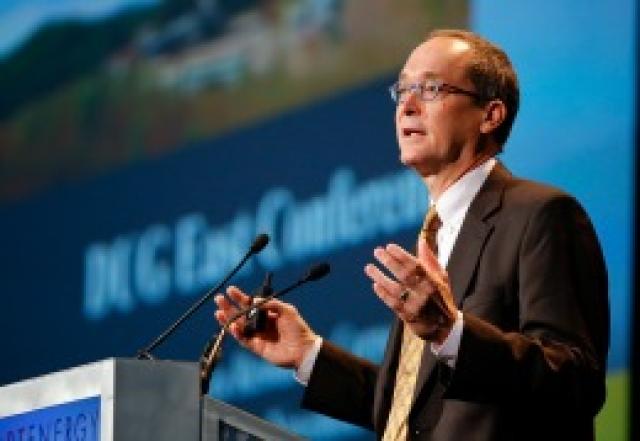
PITTSBURGH -- Most of the Marcellus shale drilling in Pennsylvania has been focused on opposite corners of the commonwealth—the southwest and northeast—but Seneca Resources has plenty happening elsewhere in the Keystone State.
Matthew Cabell, president of the National Fuel Gas Co. unit, told Hart Energy’s fifth annual DUG East conference in Pittsburgh his firm continues to complete strong wells across a sprawling acreage block stretching across northern Pennsylvania.
“We’ve taken time to identify sweet spots through the center portion of the state,” Cabell told DUG East, which attracted a record crowd of than 4,200 attendees. “We have a significant Marcellus exposure.”
Seneca has substantial acreage focused on the Marcellus totaling 775,000 net acres, “some of which are held in fee so we don’t pay royalty,” he added. It has smaller exploration and production operations in Kansas and California.
The firm divides its Pennsylvania acreage in two, an eastern development area in Tioga, Lycoming and Potter counties that includes 60,000 net acres, mostly leased. Lycoming County wells have an average initial production rate of 16.1 MMcfd and an average estimated ultimate recovery (EUR) of 11.5 Bcf.
A much larger western area, centered in Cameron, Forest and Jefferson counties, has about 720,000 net acres, most of which is held in fee. Cabell rated the area “highly prospective” with wells that have had peak, seven-day production of 10 MMcfd and EURs as high as 8.6 Bcf.
Acreage of that size, covering a prolific trend like the Marcellus, means “there is literally decades of drilling for us,” Cabell added, with 1,700 to 2,000 identified, de-risked locations at $3-4 per MMBtu prices. Things look still better if and when gas prices perk up.
The firm’s fiscal 2013 Appalachia region annual production will exceed 100 Bcf and Cabell projected fiscal 2014 production will be between 125 to 143 Bcf. Its fiscal 2013 Marcellus exit rate was approximately 360 MMcfd and Seneca currently projects its fiscal 2014 exit rate in the Marcellus will rise to around 500 MMcfd. Its fiscal year ends Sept. 30.
Much of that drilling success has come because Seneca has successfully “cracked the code” through active drilling year, he said. That has yielded a much better understanding of the region’s geology and identified more effective hydraulic fracturing techniques, including longer horizontal laterals and tighter spacing of frac stages.
Seneca projects its fiscal 2014 capital budget for its Appalachian drilling and production operations of $460 to $520 million, compared with $428 million for fiscal 2013.
Having a utility parent with existing midstream assets in the region has allowed Seneca to mark Marcellus finding and development costs at 99 cents per Mcfe this year. Its breakeven price also has been attractive, falling well below $3 per Mcfe for the prolific Lycoming County wells.
National Fuel has major expansion plans in the works for its existing Appalachian midstream operations, which include gathering, transmission and storage systems. Cabell rated those midstream assets as “critical” to the profitable unlocking of highly productive – but remote – Pennsylvania Marcellus wells.
Recommended Reading
Court Rejects Activists’ Protest of Woodside LNG Pipeline Project
2025-03-31 - Woodside Energy Group prevailed against environmental groups’ arguments to stop a pipeline to Louisiana LNG in a case that originated before the Australian company bought the project.
Kimmeridge to Grow to 1 Bcf/d Via Bits and Bids, Including Haynesville
2025-03-31 - Kimmeridge Texas Gas expects to be producing nearly as much gas as its 1.3 Bcf/d Commonwealth LNG plant will export when it comes online in 2029, said CEO Dave Lawler.
OPAL Completes $8.9MM Sale of IRA Investment Tax Credits
2025-03-31 - The credits were generated from the Sapphire RNG facility, a joint venture that is 50% owned by OPAL Fuels.
Norges Bank Acquires $1.5B Stake in North Sea Wind Projects
2025-03-31 - Norges Bank’s deal with RWE includes the Nordseecluster wind farm in the German North Sea and the Thor wind farm in the Danish North Sea.
What's Affecting Oil Prices This Week? (March 31, 2025)
2025-03-31 - For the upcoming week, Stratas Advisors predict that the price of Brent crude will move sideways and struggle amid concerns and uncertainties about the impact of the tariffs imposed by the Trump Administration.
Comments
Add new comment
This conversation is moderated according to Hart Energy community rules. Please read the rules before joining the discussion. If you’re experiencing any technical problems, please contact our customer care team.





